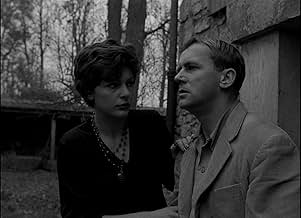Paris nous appartient
- 1961
- Tous publics
- 2h 21min
Anne Goupil fait par hasard la connaissance d'un groupe d'individus, tous convaincus de l'existence d'une sorte de conspiration mondiale. Peu après, Juan le guitariste, un des leurs, trouve ... Tout lireAnne Goupil fait par hasard la connaissance d'un groupe d'individus, tous convaincus de l'existence d'une sorte de conspiration mondiale. Peu après, Juan le guitariste, un des leurs, trouve une mort mystérieuse.Anne Goupil fait par hasard la connaissance d'un groupe d'individus, tous convaincus de l'existence d'une sorte de conspiration mondiale. Peu après, Juan le guitariste, un des leurs, trouve une mort mystérieuse.
- Réalisation
- Scénario
- Casting principal
- Récompenses
- 1 victoire et 1 nomination au total
- Ida
- (as Louise Roblin)
Avis à la une
Well I'm not a big fan of New Wave (or free-form jazz), so it was rather begrudgingly that I watched this film. Surely enough, it begain in a sort of expressionistic delirium, prompting me to say, "oh great. here we go again. haiku anyone?" But suddenly it reins in, and a very lucid story materializes out of the haze. I was pleasantly surprised. There are many compelling allusions--if not outright parallels--with the classic play "Pericles, Prince of Tyre" as well as Molière and Goethe. This means that the film adopts a certain bit of structure, which is highly unusual for New Wave. I found it very refreshing. With philosophical overtones of Sartre and Camus as well, it's by far the most head-scratching, beard-stroking New Wave film I've seen, and it's not just existentialistic babble either (although there is a hefty share of existentialism).
Its biggest flaw, however, is that it seems to attacks too many themes at once, and in so doing, it dilutes the power it could have had. There's only so much that can be packed into a film, even if it is 140 mins. As a few other reviewers have pointed out, the ideas presented are truncated. Mere fragments. The director intended this, as we see in a dialogue where two characters discuss how the play Pericles is a very fragmented tale which comes together only at the end. HOWEVER, in the case of "Paris nous appartient", it doesn't seem to come together. Whether this was deliberate irony on the director's part or whether it was just poor execution, I can't say. But either way it left me unfulfilled.
It is possible that I missed something. Perhaps I should see it a 2nd time, but unfortunately it falls just shy of the good-enough-to-see-a-2nd-time mark. I did enjoy it, and I'm glad I watched it, but I probably wouldn't care to see it again.
If you see this movie and agree with what I've written, then I think you'll enjoy the film "Orphée" (1950).
Oh, and just a word about the music in this film (since I've already made the analogy of jazz), it's... well... wacky. It's really the equivalent of jazz improv except with symphonic instruments. At times it fits the absurdity of the moment perfectly. But at other times, especially during the dialogue, it can be a bit distracting. I kept wondering to myself how much better it would have been with just a single brooding piano instead of the experimental orchestra noises. But music is entirely a personal taste, so you may enjoy it.
So we have a film-within, as often with Nouvelle Vague, but also a film without. Or better yet, the film we are watching as devised by unseen minds above shaping its world. Bridged by actors (and non-actors) who act parts knowingly or unknowingly, who may be chess pawns moved in turn by other pawns. The idea is that eventually we never get to find out how much of what we saw was this game and whether or not the game was imagined or masking a sinister plot.
So far so good, a complex film in which to superimpose the various grids. Yet at the same time not so complex after all, rather obvious in how it handles us the various keys.
For example; describing the play he's staging, the director says that he welcomes the challenge of bringing order to the convoluted mesh of different roles, that the world of the play is chaotic but not absurd. Does anyone have doubts that we're watching a surrogate Rivette describe the film? Then the stuff about conspiracies. The idea is of course that they may or may not be true, yet in getting there we are treated with naive politics about money ruling the world, a policed, monitored world.
In the finale we get some rather interesting insinuations about where the mind conspiring for answers in the face of an uncertain world leads us. When anything is imagined to be possibly true, nothing is.
The one notion that holds some actual power in all this, is precisely the one that is not explicit. A film noir plot elusively unraveling in the background of so much distraction, about a mistress and her ex-lover arranging murders as suicides. Why, to what end, again open ends. We may or may not imagine this, but this ambiguity is ours.
We would later find in the films of David Lynch and Raoul Ruiz all this situated back in the imaginative mind, where all our fanciful storytelling begins and where the illusionary images (bent by desire) we use to represent reality are born. In more cinematic ways, more fluid. This maintains the appearance of an ordinary world, it's talky, and the camera is not adventurous. It's never really dangerous, except until too late, or passionately engaged in its codas.
But one of the places this mode begins is here, in nascent form. Earlier yet, it was film noir, which the film references and even innovates in an important way, ingenious for its time (by making the noir plot the vague inference, and the karmic forces of noir the explicit reference and actively recognized by the characters). Although it often appeared clearcut and about a simple crime, it was riskier stuff in the right hands.
(A few more words on this: with noir we view a threatening cityscape where cast upon it are shadows of the mind, illusions of desire about a woman or money which in turn distort what is perceived of reality. With the post-noir landscapes (such as in Lynch), we experience instead the world of the mind - now the shadows are inverted, they're pieces of reality which seep back as filmic devices, which the mind arranges into a movie plot that sustains the illusion! This is for me one of the most fascinating journeys available in cinema, from Shangai to Inland Empire, and Rivette's film may not have refined as much but it's an important link in the transition.)
Begun in 1957 and completed three years later, it was then-critic Jacques Rivette's first full-length film as a director and one of the first works of the French New Wave, though it was not released theatrically until 1961. Oddly, it seems to be one of the lesser-known today, despite being a fascinatingly odd mystery.
Apparently many people say this film is "like a David Lynch movie". That similarity is there, so I appreciate that... but then the question becomes, does that mean that David Lynch films are "like a Jacques Rivette movie" since Rivette came first by quite a few years?
Le saviez-vous
- AnecdotesAs an inside joke, in Les Quatre Cents Coups (1959) the film Antoine Doinel and his parents go to see is "Paris Belongs to Us", which wouldn't be released for another two years.
- GaffesNear the end, when Pierre is on a public phone at Dupleix, a poster near him reads "DIMANCHE 31 MAI" (Sunday 31 May), advertising a meeting of the Parti Socialiste Unifié. May 31st was a Sunday in 1959, and this scene was filmed in late 1958. However, the film is supposed to be taking place in June 1957, so it makes no sense that a meeting is being advertised nearly 2 years in advance.
- Citations
Bernard: You're the guilty ones, with bloodstained hands.
Philip Kaufman: You go too far.
Bernard: Too far? Too far?
Philip Kaufman: What about Mayakovsky? He wasn't Spanish, but he killed himself.
Bernard: Mayaskovsky who?
Blonde à la party: Mayakovsky, wowsky!
[laughs]
- Crédits fous"Paris belongs to nobody." PEGUY
- ConnexionsFeatured in Cinéma, de notre temps: Jacques Rivette le veilleur: 1-Le jour (1990)
Meilleurs choix
- How long is Paris Belongs to Us?Alimenté par Alexa
Détails
- Date de sortie
- Pays d’origine
- Langues
- Aussi connu sous le nom de
- Paris Belongs to Us
- Lieux de tournage
- Pont des Arts, Paris 6, Paris, France(2 scenes on bridge)
- Sociétés de production
- Voir plus de crédits d'entreprise sur IMDbPro
- Durée
- 2h 21min(141 min)
- Couleur
- Mixage






















